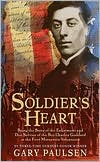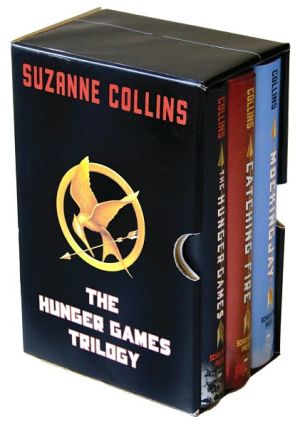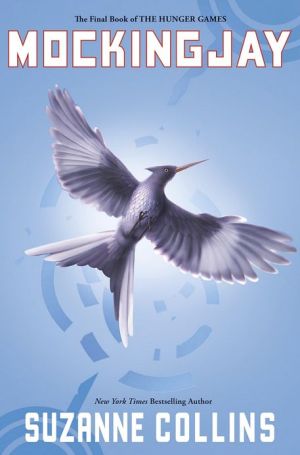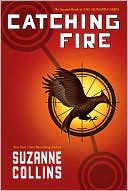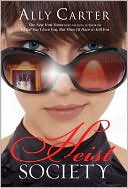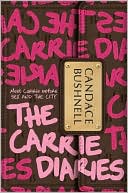Soldier's Heart: Being the Story of the Enlistment and Due Service of the Boy Charley Goddard in the First Minnesota Volunteers
In June 1861, when the Civil War began, Charley Goddard left his farm and enlisted in the First Minnesota Volunteers. He was fifteen. He didn't rightly know what a "shooting war" meant, or what he was fighting for. All he knew was that he didn't want to miss out on a great adventure.\ \ The shooting war meant the horror of combat and the wild luck of survival. It meant knowing how it feels to cross a field toward the enemy, waiting for fire. Waiting for death. And Charley learned 'This is how...
Search in google:
Although he was eager to enlist, 15-year-old Charley Goddard has a change of heart after experiencing both the physical horrors and mental anguish of Civil War combat. Battle by battle, Gary Paulsen shows readers the turmoil of war through one boy's eyes and one boy's heart -- and gives voice to all the anonymous young men who fought in the Civil War.— Riverbank Review - Martha Davis BeckPaulsen doesn't address the issues that bring men to war; he is interested in describing what war is. In our age of missiles, which can make war seem more remote and its effects less palplable, a novel like Soldier's Heart may be an important one for young adults to read—and to remember.
JUNE 1861 \ \ He heard it all, Charley did; heard the drums and songs and slogans and knew what everybody and his rooster was crowing.\ \ There was going to be a shooting war. They were having town meetings and nailing up posters all over Minnesota and the excitement was so high Charley had seen girls faint at the meetings, just faint from the noise and hullabaloo. It was better than a circus. Or what he thought a circus must be like. He'd never seen one. He'd never seen anything but Winona, Minnesota, and the river five miles each way from town.\ \ There would be a shooting war. There were rebels who had violated the law and fired on Fort Sumter and the only thing they'd respect was steel, it was said, and he knew they were right, and the Union was right, and one other thing they said as well—if a man didn't hurry he'd miss it. The only shooting war to come in a man's life and if a man didn't step right along he'd miss the whole thing.\ \ Charley didn't figure to miss it. The only problem was that Charley wasn't rightly a man yet, at least not to the army. He was fifteen and while he worked as a man worked, in the fields all of a day and into night, and looked like a man standing tall and just a bit thin with hands so big they covered a stove lid, he didn't make a beard yet and his voice had only just dropped enough so he could talk with men.\ \ If they knew, he thought, if they knew he was but fifteen they wouldn't take him at all.\ \ But Charley watched and Charley listened and Charley learned.\ \ Minnesota was forming a volunteer regiment to go off and fight. It would have near on a thousand men when it was full, men from Winona andTaylor's Falls and Mankato and as far north as Deerwood and from the capital, St. Paul, as well.\ \ A thousand men. And Charley had learned one thing about an army: One part of an army didn't always know the business of another part. The thousand men in the regiment would be in companies of eighty to a hundred men from each section and it would be hard for a man to know men who weren't from the same area.\ \ Charley couldn't join where they knew him. Somebody would spill the beans and he'd get sent back or used as a runner or drummer boy. He wasn't any boy. He was going to sign to fight as a man and he knew a way to do it.\ \ They would gather at Fort Snelling, up along the Mississippi. All the companies from all the towns would assemble there before they went off to fight.\ \ He'd just take him a walk, Charley would, take a walk by himself until he was at Fort Snelling and there he would lie about his age and sign up as a man and get him a musket and a uniform and go to see what a war was like.\ \ "I won't get into any trouble, Ma," he said, wrapping some bread and cold potatoes and half a roast chicken in some tow cotton. "Plus they'll be paying me. I hear they give eleven dollars a month. I'll send most of it on home to you and Orren." Orren was his younger brother. "You can use the money and I won't be under your feet all the time...."\ \ "You aren't under my feet." She hated it when he talked fast. He always got his way when he talked fast. He'd smile and that cowlick would stand up in the back and he'd talk fast and she couldn't keep him from what he wanted. He was a good boy, as good as they came, but ever since his father, Paul, had been kicked to death by a horse gone mad when a swarm of bees landed on it, Charley only had to smile and talk fast and he got his way. "You haven't ever been under my feet."\ \ "Same as," he said, shaking his head. "I'm always in the way. Best I go off and see what the big fuss is all about."\ \ "You ain't but a boy."\ \ "And I've got to be a man sometime. You've said it more than once yourself. Charley, you said, you've got to be a man. Well, here it is—my chance to be a man. A boy wouldn't go off to earn eleven dollars a month and wear a uniform. Only a man. So I'm going to be a man and do what a man can do."\ \ And he won. She knew he would and he did and he took his bread and cold potatoes and chicken and left home walking down the road for Fort Snelling, and if she had known what was to come of it, if she had known and could tell him what would come of it, she would have fought to drag him back and let the federal government keep their eleven dollars a month.\ \ But she also had heard the songs and the slogans and seen the parades, had been to the meetings, and though it was her son Charley leaving she did not think it would be so bad. Nobody thought it would be so bad. Nobody thought it could be so bad. And all the officers and politicians and newspapers said it would be a month or two, no longer.\ \ It would all be over by fall.\ \ \ From the Audio Cassette (Unabridged) edition.\
\ From Barnes & NobleBookseller ReviewsLittle Charley Goddard was a soldier with a secret. This diminutive, grim-faced Minnesota volunteer was underage; only fifteen; seduced by the sound of drums and songs and slogan to march off to a war he couldn't imagine. An electrifying and sobering Civil War novel.\ \ \ \ \ Library JournalFirst published in 1998, this story of the Civil War as seen through the eyes of 15-year-old Charley Goddard is less bearable. Paulsen spares the reader nothing in this first-person account, based on a true story. You can smell the rot and feel Charley's sickness as he experiences the horrors and mental toll of fighting at Bull Run and Gettysburg. While a strong stomach is a requisite, the payoff is some of the most compelling and immediate writing for teens on the subject of war. Charley does return to his home in Minnesota, only to die in his early twenties, a victim of his "soldier's heart."—Angelina Benedetti, "35 Going on 13," BookSmack! 8/19/10\ \ \ Martha Davis BeckPaulsen doesn't address the issues that bring men to war; he is interested in describing what war is. In our age of missiles, which can make war seem more remote and its effects less palplable, a novel like Soldier's Heart may be an important one for young adults to read—and to remember.\ Riverbank Review\ \ \ \ \ Publishers WeeklyFrom the author interview at the beginning of this recording, listeners will be caught up in Paulsen's storytelling. His wrenching look at the brutal Civil War (based on one boy's real-life experiences) comes to life via Wendt's (Cheers) robust bass voice. As a patriotic and eager 15-year-old, Charley Goddard lies about his age to join the First Minnesota Volunteers in 1861. He never imagines that taking part in the "shooting war" means watching thousands of men be killed and wounded and seeing many others suffer from dysentery and other diseases. From Bull Run to Gettysburg, listeners march with Charley to the front lines, getting a better picture of just how awful battle can be. Though Charley survives the war with only relatively minor physical injuries, his mind and soul are forever changed--he suffers post-traumatic stress disorder, then called soldier's heart. He dies, feeling much older than his years, at 23. Wendt provides some tender moments as Charley deals with horrific conditions, and he skillfully avoids melodrama in a generally straightforward reading. Ages 12-up. (Nov.) Copyright 1999 Cahners Business Information.\ \ \ \ \ VOYACharley Goddard boosts his age from fifteen to eighteen, enlists to serve with the First Minnesota Volunteers in the Civil War, and in battles from Bull Run to Gettysburg learns that war is not adventure but grinding horror. Post traumatic stress disorder, shell shock, and battle fatigue are newer, more clinical terms for Charley's "soldier's heart," a malady shared with other survivors of the madness, stench, heroism, and weariness of war. Readers watch Charley as he endures the monotony of waiting; expends fruitless efforts to keep himself, his food, and his weapon clean and dry; retreats into himself as a defense against the agony of losing friends; and is seriously wounded at Gettysburg. A "good" soldier in battle, no better or worse than others, Charley believes he has no control over his own life or death. Every part of soldiering--camp life, food, relationships, killing, and questioning--comes alive as Charley survives and grows old far too quickly. In the compelling final chapter Charley remembers what he wants to remember; "pretty things," he calls them: dew on a leaf, pretty girls, a black and shining Confederate revolver. The real Charley Goddard volunteered, trained, and fought with the First Minnesota and was wounded at Gettysburg. He returned to Minnesota but died within a few years from his Gettysburg wounds and soldier's heart. This is a spare and lucid document of war and of one of its memorable participants, child-man Charley Goddard. VOYA Codes: 5Q 4P J S (Hard to imagine it being any better written, Broad general YA appeal, Junior High-defined as grades 7 to 9 and Senior High-defined as grades 10 to 12).\ \ \ \ \ KLIATTTo quote from KLIATT's July 1998 review of the hardcover edition: "Soldier's heart" is another euphemism for the horrible effects of war on a soldier—we've also heard of shell shock, battle fatigue, and post-traumatic stress disorder, all terms used to describe the indescribable from later wars. Charlie is from an isolated farm in Minnesota, who at 15 has little understanding of why the Civil War is being fought, or about the wider world. He wants experience, adventure, and to prove himself a man, so he enlists, lying about his age. The details of what follows for Charlie are sparse, but powerful. He takes part in several crucial battles and endures months of camp life until Gettysburg, where multiple wounds nearly kill him. This brief book gets to the reality of brutal warfare quickly. It delivers an emotional impact that even reluctant readers will experience, and so would be a good book to choose for such students in history or social studies classes. (Editor's note: This book is an ALA Best Book for YAs.) KLIATT Codes: JS*—Exceptional book, recommended for junior and senior high school students. 1998, Random House/Dell/Laurel-Leaf, 106p, map, bibliog, 18cm, $5.50. Ages 13 to 18. Reviewer: Claire Rosser; November 2000 (Vol. 34 No. 6)\ \ \ \ \ School Library JournalGr 7 Up-"Nothing about war is good," says author Gary Paulsen in the interview that opens this recording of Soldier's Heart Delacorte, 1998. This short novel is an honest look at the actual Civil War experiences of Charley Goddard, a 15-year-old who served in the Union Army. Without sentimentality, Paulsen presents all the elements of 19th century warfare, from the boredom to the brutality. The story chronicles the adolescent's transition from an eager youth to a dissipated young man. Charley survives several major battles, but he goes home spiritually and physically crushed, destined to die before his 24th birthday. George Wendt Norm on Cheers provides an unemotional reading of the text. Though it may sound laconic, it does convey the young soldier's internal shutdown as he moves between rage and fear. There is an author's note at the end of the narration that adds more information about Charley and the period. The lightweight cassette box, not like Listening Library's usual audiobook case, is not suitable for circulation. The quality and brevity of this recording make it an excellent supplement to middle and high school classes studying the Civil War. For school and public libraries.-Barbara S. Wysocki, Cora J. Belden Library, Rocky Hill, CT Copyright 2000 Cahners Business Information.\ \ \ \ \ Henry Mayer. . .[A] stark, utterly persuasive novel of combat life in the Civil War. . . -- The New York Times Book Review\ \ \ \ \ Kirkus ReviewsThe nightmare of the Civil War comes to the page in this novel from Paulsen (The Transall Saga), based on the real-life experiences of a young enlistee. Charley Goddard, a hard-working, sweet-tempered Minnesota farm boy, can't wait to sign up when the call comes for men to defend the Union. But the devoted son and brother who looks forward to sending home the $11 a month he earns for his soldiering is not prepared for the inedible food, ill-fitting uniform, or the dysentery he experiences just while training. The passages on the battles of Bull Run and Gettysburg are—as they should be—disconcerting, even upsetting, in the unflinching portrayal of the bloodshed and savagery of war. What is truly remarkable is Paulsen's portrayal of Charley, who is transformed from an innocent boy into a seasoned—but not hardened or embittered—soldier. Most haunting of all, more than the fiery skirmishes themselves, is the final picture of Charley, so shaken and drained from the experience that the only peace he can envision lies within suicide. An author's note tells of Charley's true fate; dead at 23 from the psychological and physical ravages of war.\ \
